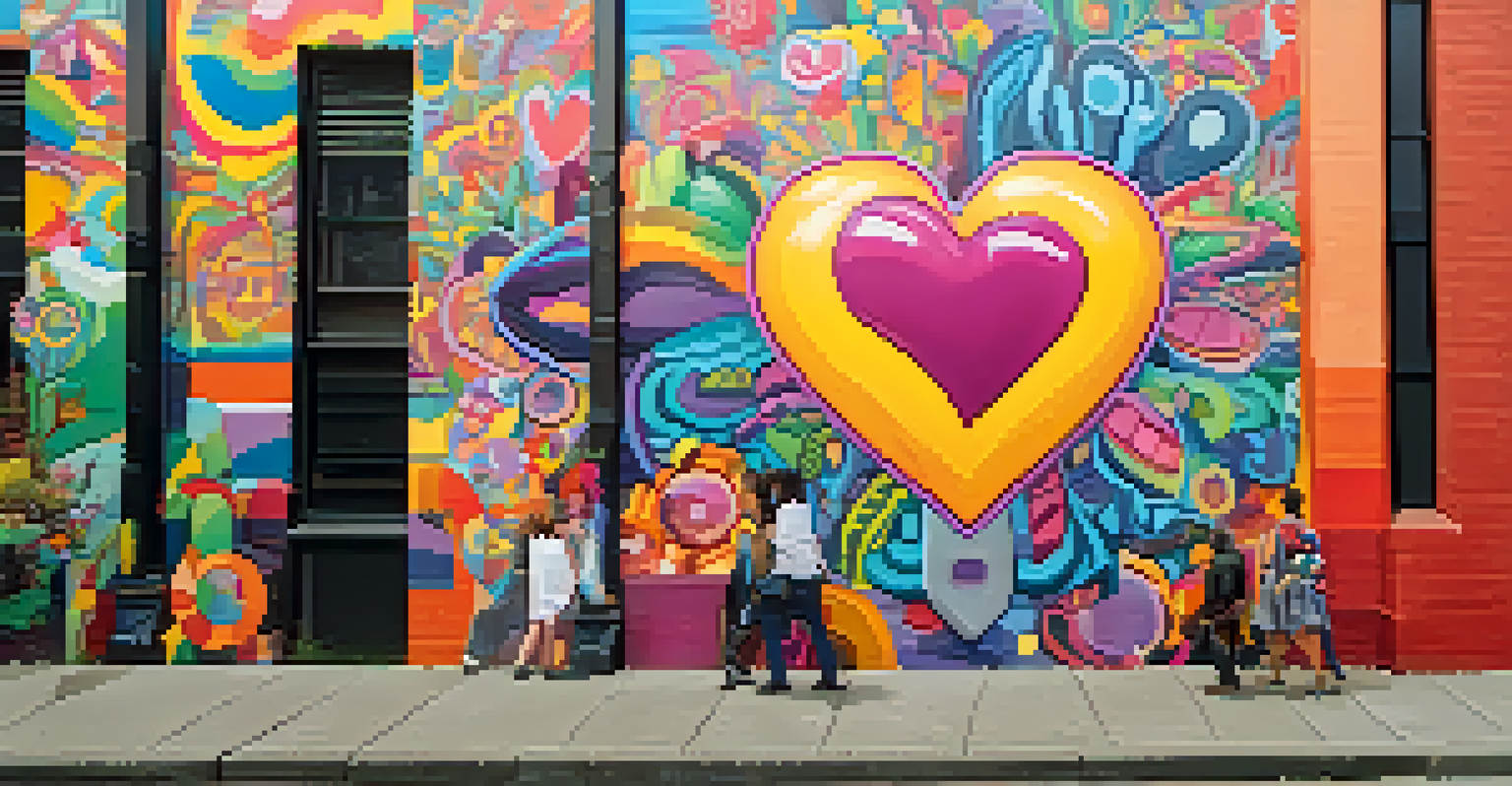How Mental Health Narratives Evolve in Hollywood Over Time

Early Representations: Stigma and Stereotypes
In the early days of Hollywood, mental health issues were often shrouded in stigma. Movies typically depicted mental illness as a source of horror, with characters portrayed as dangerous or mad. This not only reinforced negative stereotypes but also contributed to a societal fear of mental health conditions.
Mental illness is nothing to be ashamed of, but stigma and bias shame us all.
For instance, films like 'One Flew Over the Cuckoo's Nest' showcased institutions as oppressive environments, further feeding into the public's misconceptions. Characters were often one-dimensional, lacking depth or real human experiences. This portrayal left a lasting impact on how society viewed those struggling with mental health issues.
As a result, early cinematic narratives created barriers to understanding and compassion, making it difficult for audiences to empathize with the complexities of mental health. The representation of mental illness was more about sensationalism than reality, which has shaped conversations for decades.
The Shift: From Horror to Understanding
As societal attitudes began to shift, so did the narratives in Hollywood films. The late 20th century saw a growing awareness and acceptance of mental health issues, leading to more nuanced portrayals. Filmmakers started to depict characters with mental illnesses as relatable and complex individuals rather than mere caricatures.

An example of this shift can be seen in films like 'A Beautiful Mind,' which highlighted the struggles and triumphs of a real-life mathematician living with schizophrenia. This film not only brought mental health issues to the forefront but also aimed to educate audiences about the realities of living with a mental health condition.
Stigma Eases in Film Representations
Hollywood has shifted from portraying mental illness as horror to depicting characters with depth and complexity.
These evolving narratives fostered a greater sense of empathy and understanding, paving the way for more open discussions about mental health in society. Hollywood started to play a pivotal role in demystifying mental illness, encouraging viewers to see beyond the stigma.
The Rise of Authentic Storytelling
In recent years, authenticity has become a key focus in Hollywood, leading to more genuine representations of mental health. Filmmakers are increasingly collaborating with mental health professionals and individuals with lived experiences to craft stories that resonate with audiences. This shift toward authenticity not only enriches the narratives but also promotes a deeper understanding of mental health issues.
The greatest weapon against stress is our ability to choose one thought over another.
Movies like 'Silver Linings Playbook' and 'Girl, Interrupted' emphasize the complexities of mental health, showcasing characters who are multifaceted rather than defined solely by their conditions. These stories highlight the importance of support systems and the journey of recovery, making mental health relatable to viewers.
This movement towards authentic storytelling reflects a broader societal change, where discussing mental health openly is becoming more accepted. Hollywood is now using its platform to foster conversations that encourage awareness and reduce stigma.
Diversity in Mental Health Narratives
As representation in Hollywood expands, so does the diversity of mental health narratives. We are now seeing stories that explore mental health issues across different cultures, genders, and backgrounds. This diversification is crucial as it addresses the unique challenges that various communities face regarding mental health.
For instance, films like 'The Farewell' and 'Crazy Rich Asians' delve into how cultural expectations and family dynamics impact mental health. These narratives not only resonate with specific audiences but also educate others about the varying factors that influence mental well-being.
Authenticity Drives Modern Storytelling
Recent films collaborate with mental health professionals to create genuine narratives that resonate with audiences.
By representing a broader spectrum of experiences, Hollywood is helping to dismantle the notion that mental health issues are a one-size-fits-all struggle. This inclusion fosters a more comprehensive understanding of mental health in society.
The Role of Streaming Services in Mental Health Portrayals
The rise of streaming services has changed the landscape of film and television, allowing for more diverse and experimental storytelling. Platforms like Netflix and Hulu are increasingly producing content that tackles mental health in innovative ways. This shift has provided creators with the freedom to explore deeper, more nuanced portrayals without the constraints of traditional media.
Shows like 'BoJack Horseman' and '13 Reasons Why' have sparked conversations around mental health, addressing issues like depression, addiction, and suicide. These narratives resonate with younger audiences, who often see their own struggles reflected on screen, fostering a sense of connection and understanding.
Streaming services have thus become a powerful medium for exploring mental health topics, bridging the gap between entertainment and education. This evolution highlights the importance of storytelling in promoting mental health awareness.
Mental Health Advocacy in Hollywood
Hollywood has also become a platform for mental health advocacy, with many celebrities using their influence to raise awareness. Public figures like Selena Gomez and Dwayne 'The Rock' Johnson have openly discussed their mental health struggles, encouraging fans to seek help and normalize the conversation around mental illness. Their stories inspire others to share their experiences, creating a ripple effect of awareness and support.
Films and documentaries focused on mental health are increasingly being produced, showcasing real-life stories that educate viewers. Projects like 'The Truth About Mental Health' and 'Stutz' delve into the realities of mental health challenges, emphasizing the importance of seeking help and understanding.
Diverse Narratives Enhance Understanding
An increase in diverse mental health stories in Hollywood helps dismantle stereotypes and fosters a broader understanding of mental well-being.
Through advocacy, Hollywood not only entertains but also plays a vital role in driving social change. By leveraging their platforms, celebrities contribute to a culture of openness and acceptance surrounding mental health issues.
The Future of Mental Health Narratives in Hollywood
Looking ahead, the future of mental health narratives in Hollywood seems promising. As awareness continues to grow, there will likely be an increase in stories that explore the complexities of mental health. Filmmakers are recognizing the importance of authenticity and representation, leading to richer narratives that resonate with audiences.
Moreover, the ongoing discussions surrounding mental health in society indicate a shift toward normalizing these conversations in film and television. As viewers demand more accurate portrayals, creators will be challenged to rise to the occasion, ensuring that mental health is treated with the respect and understanding it deserves.

Ultimately, the evolution of mental health narratives in Hollywood reflects broader societal changes. By continuing to prioritize authentic storytelling and diverse perspectives, Hollywood can play a crucial role in shaping a more compassionate understanding of mental health for future generations.